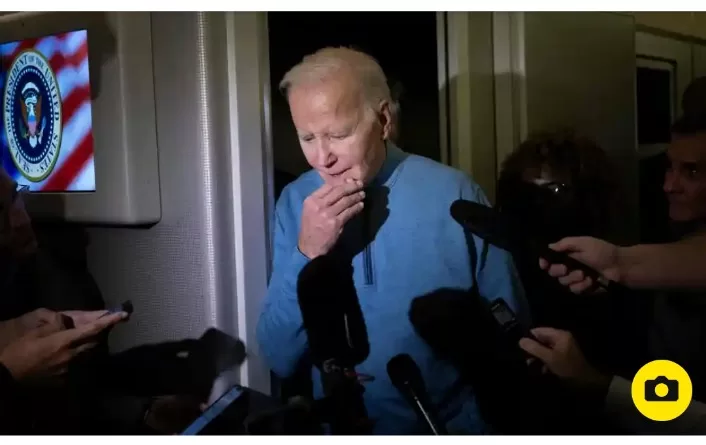In a rare and weighty Oval Office address, President Joe Biden has made a bold and direct link between Russia’s ongoing invasion of Ukraine and the recent violence involving Hamas and Israel. With only the second Oval Office address of his presidency, Biden passionately implored the American public not to relinquish their role as a global exemplar, asserting the nation’s responsibility to be “a beacon to the world.”
In a meticulously crafted 15-minute speech, President Biden announced his intent to seek congressional approval for providing assistance to both Israel and Ukraine. Simultaneously, he decried the rise of antisemitism and Islamophobia within the United States.
Biden’s address aimed to forge a narrative connecting the Ukraine and Middle East conflicts, appealing to both war-weary citizens and hardline Republicans, underscoring America’s commitments. However, this confluence of crises has prompted some unease, particularly as Israel, equipped with vastly superior military capabilities, prepares for a ground incursion into Gaza.
The President asserted, “Hamas and Putin may represent distinct threats, but they share a common goal: the complete annihilation of a neighboring democracy.” He delivered his address from the Resolute desk, flanked by flags, family photos, opulent curtains, and a dimly lit backdrop.
The diplomatic challenges posed by these simultaneous crises are a significant test for President Biden, who, at the age of 80, is older than the state of Israel itself. This challenge did not deter him from embarking on a whirlwind visit to the region just days ago.
During his visit to Tel Aviv, President Biden lent his support to Israel as it prepares for a ground offensive in response to the attacks by Hamas on October 7, which claimed the lives of over 1,400 individuals. Simultaneously, he brokered an agreement to facilitate humanitarian aid to Gaza through Egypt and urged Israel to adhere to the laws of warfare. Over the past twelve days, more than 3,000 Palestinians have lost their lives due to relentless aerial bombardment.
President Biden unequivocally denounced Hamas’s actions, referring to them as “pure unadulterated evil in the world.” He empathized with the Israelis who have been deeply affected by the conflict and reiterated America’s commitment to a two-state solution, emphasizing a peaceful resolution.
The President’s planned summit in Jordan was regrettably canceled in the wake of a devastating explosion at a Gaza hospital, triggering protests across the Middle East. President Biden expressed his sorrow over the loss of life and reaffirmed the U.S. position that the incident was “not caused by the Israelis.”
The President then turned his attention to Ukraine, a matter that has seen diminishing support from the U.S. public and Congress, particularly among Republicans. After engaging in a conversation with Ukrainian President Volodymyr Zelenskiy, President Biden emphasized the global relevance of these conflicts, stating, “History has shown us that when terrorists and aggressors face no consequences, chaos, death, and destruction escalate. The threats to America and the world continue to mount.”
While it is expected that some commentators may question the comparability of the Ukraine and Middle East conflicts, President Biden used this connection as a means to implore Congress not to abandon either issue.
He declared, “American leadership is the linchpin holding the world together. Our alliances are essential for America’s safety, and our values make us a preferred partner for nations worldwide. The potential cost of forsaking Ukraine and turning our back on Israel far outweighs any benefits.”
In conclusion, President Biden announced his intention to submit an urgent budget request to Congress on the following day to secure funding for support in these regions. He characterized this funding as a wise investment that will ensure long-term American security.
The sweeping emergency funding request is anticipated to exceed $100 billion, with approximately $60 billion allocated to Ukraine and $10 billion to Israel. It should be noted that this proposal comes at a time when the House of Representatives is mired in political deadlock, with Republicans, who hold a narrow majority, unable to elect a new Speaker.
President Biden stressed that aiding these two allies is an astute investment that will safeguard American security for generations to come. He sought to rally support for these new aid packages, asserting the importance of upholding America’s role on the global stage.
The Russian foreign ministry responded to President Biden’s reference to support as an “investment” by suggesting that the United States benefits from proxy wars rather than advocating for ideas. Russian foreign ministry spokesperson Maria Zakharova emphasized that wars have historically been favorable for the United States, given that they do not occur on American soil and the U.S. does not bear the cost of these conflicts.
Tensions have heightened within the United States due to the ongoing crisis in Israel, with protests and counter-protests sweeping the nation. President Biden has encountered criticism from activists and some members of his own Democratic party, who argue that he is prioritizing Israel’s interests while downplaying humanitarian concerns for the more than two million people in Gaza.
In a notable segment of his Oval Office address, President Biden denounced both antisemitism and Islamophobia within the United States. He offered a message of inclusivity to those affected by these forms of discrimination, affirming their place in American society.
The President referenced the tragic killing of Wadea Al-Fayoume, a six-year-old boy from a Palestinian American family, outside Chicago. Following his address, President Biden and First Lady Jill Biden reached out to Wadea’s father and uncle to express their condolences.
The United States has strategically positioned two aircraft carriers in the eastern Mediterranean to deter potential involvement in the conflict by Iran or Lebanon’s Hezbollah, both of which are allies of Hamas.
In the concluding moments of his address, President Biden issued a resounding call to both a divided Congress and a public where the “America first” isolationist sentiment, as championed by former President Donald Trump, still holds sway.
The President affirmed, “America remains a beacon to the world. Time is of the essence. Despite our domestic divisions, we must overcome them. We cannot allow petty partisan politics to impede our responsibilities as a great nation. We will not permit terrorists like Hamas and tyrants like Putin to prevail.”
Former President Donald Trump, the most likely contender against President Biden in the upcoming election, derided his efforts. Trump’s campaign released a statement characterizing President Biden as “Neville Chamberlain posing as Winston Churchill,” casting him as an ineffective leader who has set the world ablaze. The statement questioned President Biden’s credibility and characterized him as a source of ridicule for both enemies and allies.
On the other hand, Democrats voiced their support for President Biden’s address. Jaime Harrison, Chair of the Democratic National Committee, commended President Biden for unwaveringly standing with Israel and Ukraine. He criticized House Republicans for causing chaos within the House of Representatives, potentially jeopardizing crucial aid intended to support allies and safeguard national security.







